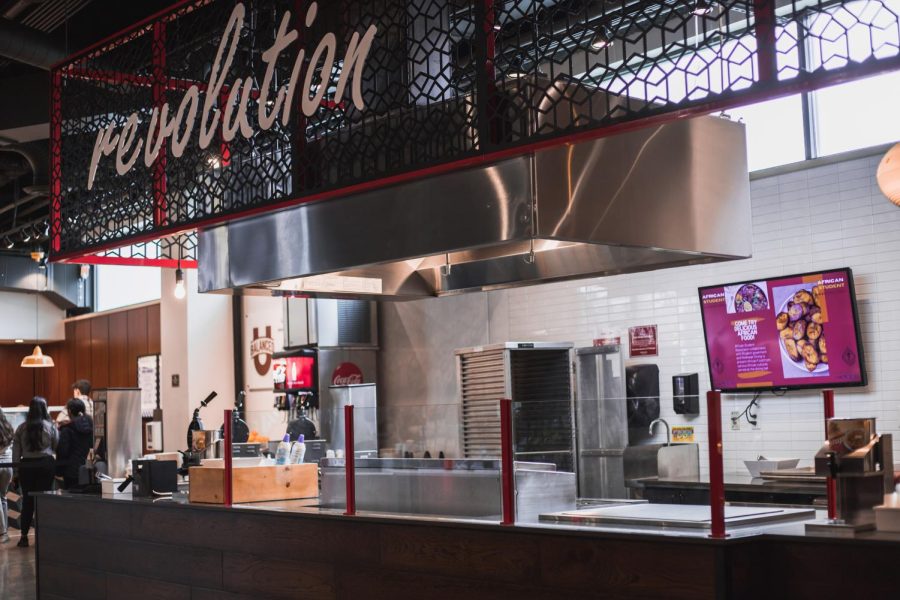Chartwells Caters Change
Empty chef station in Cherry Street Market.
From menu revisions to lengthier hours, Chartwells has been initiating changes regarding campus dining since the beginning of the school year. Chartwells management is continuing to work on the addition of new employees to relieve an ongoing worker shortage.
Each fall, the Voice to Vision survey is conducted to gain insight into what can be done to enhance the campus dining experience. As a direct result of student feedback, the Hawks Nest Bistro is open most evenings until 11 p.m., Red Hot Rudy’s is open until 10 p.m. during the week and brunch is available until 2 p.m. on the weekends. Redhawk Dining has also initiated successful partnerships with local businesses including Blazing Bagels at The Bottom Line and Boon Boona Coffee at the Sidebar Cafe. Many of the survey respondents stated preferences for smoothies and made-to-order pasta, and Chartwells is finalizing plans to reintroduce these options in response.
All COVID-19 restrictions on the restaurant industry in Seattle have been lifted, allowing Redhawk Dining to operate in the same fashion as they did pre-COVID. Regardless, they have taken increased measures to ensure that students feel safe. Additional janitorial staff have been hired, as well as the role of Quality Assurance Manager who works to ensure that all safety guidelines are met and exceeded.
Last year, Chartwells employees voiced their concerns regarding workplace safety, underpayment and food safety, many of which arose due to understaffing.
Andrew Gaynor, Seattle University Resident District Manager for Redhawk Dining, recounted that over 70 percent of full-time staff returned as they reopened to pre-COVID business volumes. Regardless, they struggled to hire staff early on in the school year, which has recently changed.
“As of late we have had a significant uptick in the hiring of full-time staff members and have had great success in hiring additional student workers to support during our peak times,” Gaynor wrote to The Spectator.
Cameron Mundy, a second-year visual art major and cashier, has had a great experience working with Chartwells with the exception of shifts at the Hawks Nest Bistro. Since it is open until 11 p.m., it is the only dining option that is open on campus at certain hours of the night. He explained that many of the workers do not want to work that late, so at a certain point, the only people working are often Mundy, his supervisor and the chef.
Consequently, Mundy feels that he now has to plan his classes around his work schedule.
“Now, after figuring out that I’m going to be the only person working after 10 p.m., I’m thinking to myself that maybe I shouldn’t take early morning classes so that I can work later and I don’t have to leave my coworkers in the lurch,” Mundy said.
Marissa Baker, an assistant professor at the University of Washington Department of Environmental and Occupational Health Sciences, explained that understaffing can make those who are working feel like they are unable to take time off.
“[Understaffing] can not only impact mental health because they feel like they’re working more than they used to or not able to take breaks, but it can also actually be bad for physical health too,” Baker said. “People feel like they can’t take sick leave, so they’re coming to work and can spread disease not only to their coworkers but also to the public that they interact with.”
In all places of employment, Baker explained that having access to time off is crucial for prioritizing worker mental health. Having employers that listen to their employees’ concerns and act upon them accordingly is equally as important.
“You should be able to take the time off that you are entitled to without any kind of fear of retaliation or retribution from your boss or other employees,” Baker said. “Also, around ensuring that there are appropriate grievance policies for workers where their input is listened to and acted upon.”
Students await the implementation of the upcoming changes to on-campus dining, such as Chartwells introducing new dining options to campus. Given the centrality of C-Street to the daily lives of undergraduate students, the changes will have far-reaching implications for those who rely upon university dining plans.


